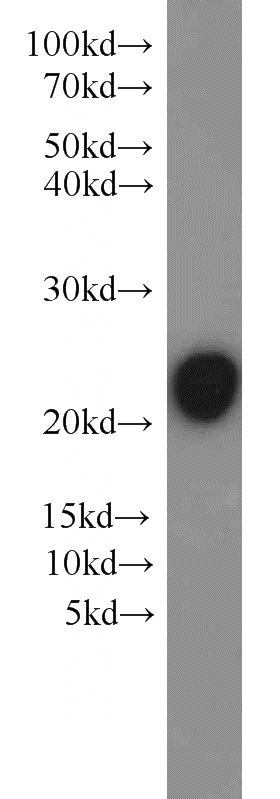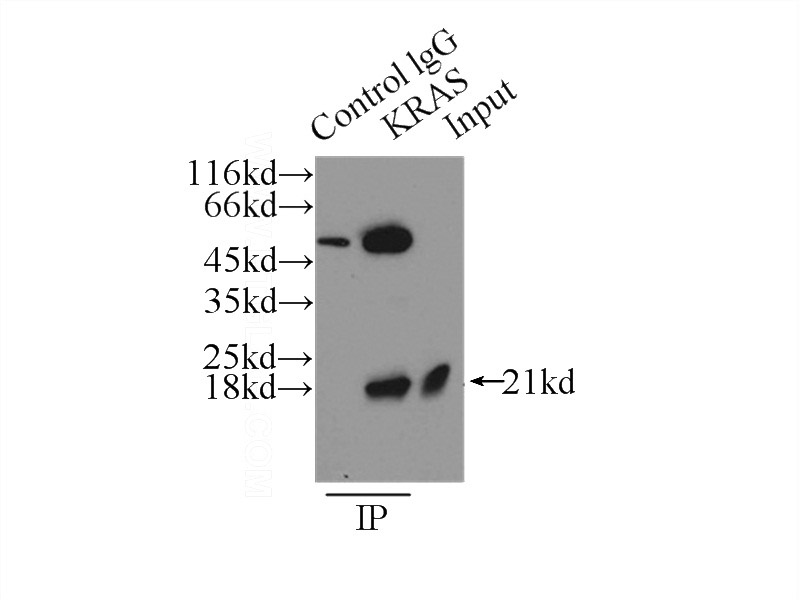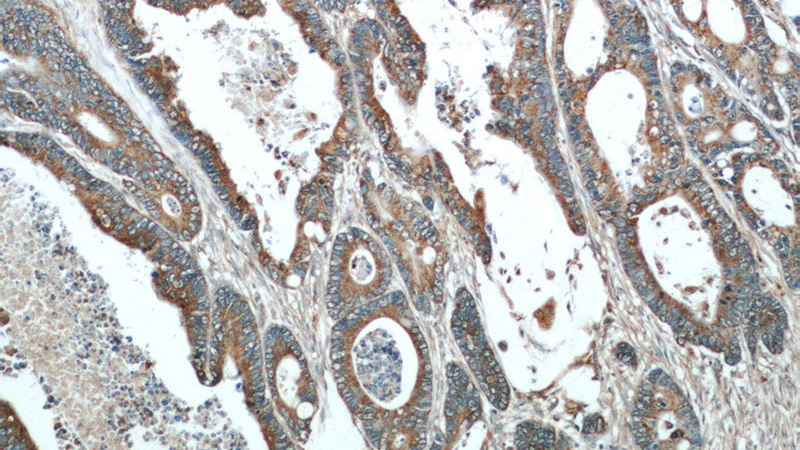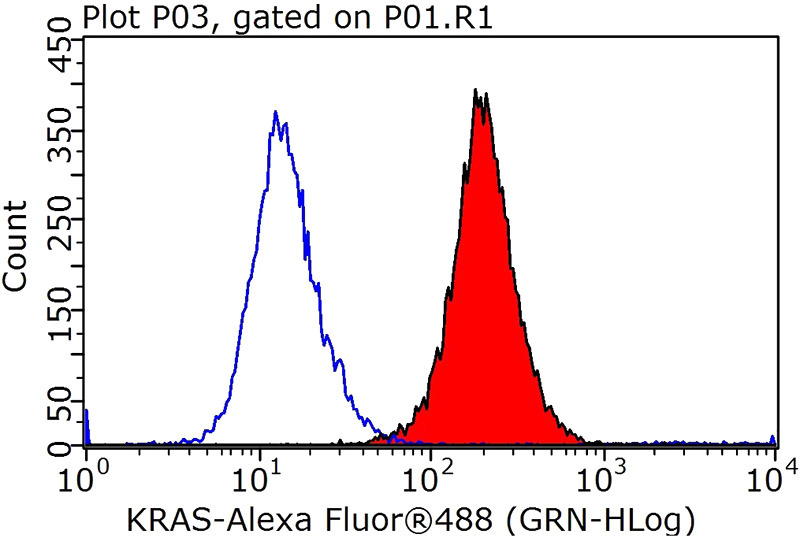-
Product Name
KRAS antibody
- Documents
-
Description
KRAS Rabbit Polyclonal antibody. Positive WB detected in mouse brain tissue, A549 cells, HEK-293 cells, HeLa cells, human brain tissue, human kidney tissue, mouse kidney tissue, rat brain tissue, rat kidney tissue. Positive IP detected in HeLa cells. Positive IHC detected in human colon cancer tissue, human breast cancer tissue, human lung cancer tissue. Positive FC detected in HeLa cells. Observed molecular weight by Western-blot: 21 kDa
-
Tested applications
ELISA, WB, IP, FC, IHC
-
Species reactivity
Human,Mouse,Rat; other species not tested.
-
Alternative names
C K RAS antibody; c Ki ras antibody; GTPase KRas antibody; K Ras 2 antibody; K RAS2A antibody; K RAS2B antibody; K RAS4A antibody; K RAS4B antibody; KI RAS antibody; KRAS antibody; KRAS1 antibody; KRAS2 antibody; KRAS2B speicifc antibody; Krasa antibody; Krasb antibody; NS3 antibody; RASK2 antibody
-
Isotype
Rabbit IgG
-
Preparation
This antibody was obtained by immunization of KRAS recombinant protein (Accession Number: XM_011520653). Purification method: Antigen affinity purified.
-
Clonality
Polyclonal
-
Formulation
PBS with 0.1% sodium azide and 50% glycerol pH 7.3.
-
Storage instructions
Store at -20℃. DO NOT ALIQUOT
-
Applications
Recommended Dilution:
WB: 1:500-1:5000
IP: 1:500-1:5000
IHC: 1:20-1:200
-
Validations

mouse brain tissue were subjected to SDS PAGE followed by western blot with Catalog No:112119(KRAS antibody) at dilution of 1:1000

IP Result of anti-KRAS (IP:Catalog No:112119, 3ug; Detection:Catalog No:112119 1:1000) with HeLa cells lysate 2500ug.

Immunohistochemical of paraffin-embedded human colon cancer using Catalog No:112119(KRAS antibody) at dilution of 1:50 (under 10x lens)

Immunohistochemical of paraffin-embedded human colon cancer using Catalog No:112119(KRAS antibody) at dilution of 1:50 (under 40x lens)

1X10^6 HeLa cells were stained with 0.2ug KRAS antibody (Catalog No:112119, red) and control antibody (blue). Fixed with 90% MeOH blocked with 3% BSA (30 min). Alexa Fluor 488-congugated AffiniPure Goat Anti-Rabbit IgG(H+L) with dilution 1:1000.
-
Background
KRAS, also called p21, is a member of the Ras superfamily of proteins. It is located on human chromosome 12, and contains four coding exons and a 5' non-coding exon (PMID: 12778136). KRAS is a membrane-anchored guanosine triphosphate/guanosine diphosphate (GTP/GDP)-binding protein and is widely expressed in most human cells. Like other members of the Ras family, the KRAS protein is a GTPase, and it is involved in intracellular signal transduction and mainly responsible for EGFR-signaling activation (PMID: 19117687). KRAS mutations have been found in various malignancies, including lung adenocarcinoma, mucinous adenoma, ductal carcinoma of the pancreas and colorectal carcinoma. KRAS has two isoforms, a and b. This KRAS antibody (12063-1-AP) is a Pan-RAS antibody, which can recognize Kras, Hras and Nras.
-
References
- Chu PC, Yang MC, Kulp SK. Regulation of oncogenic KRAS signaling via a novel KRAS-integrin-linked kinase-hnRNPA1 regulatory loop in human pancreatic cancer cells. Oncogene. 2015.
- Xu Q, Fu R, Yin G, Liu X, Liu Y, Xiang M. Microarray-based gene expression profiling reveals genes and pathways involved in the oncogenic function of REG3A on pancreatic cancer cells. Gene. 578(2):263-73. 2016.
- Ji H, Lee JH, Wang Y. EGFR phosphorylates FAM129B to promote Ras activation. Proceedings of the National Academy of Sciences of the United States of America. 113(3):644-9. 2016.
- Han HB, Gu J, Zuo HJ. Let-7c functions as a metastasis suppressor by targeting MMP11 and PBX3 in colorectal cancer. The Journal of pathology. 226(3):544-55. 2012.
- Hsu TI, Wang MC, Chen SY. Sp1 expression regulates lung tumor progression. Oncogene. 31(35):3973-88. 2012.
- Sasaki AT, Carracedo A, Locasale JW. Ubiquitination of K-Ras enhances activation and facilitates binding to select downstream effectors. Science signaling. 4(163):ra13. 2011.
- Laheru D, Shah P, Rajeshkumar NV. Integrated preclinical and clinical development of S-trans, trans-Farnesylthiosalicylic Acid (FTS, Salirasib) in pancreatic cancer. Investigational new drugs. 30(6):2391-9. 2012.
- Zhang B, Zhang X, Tang B, Zheng P, Zhang Y. Investigation of elemene-induced reversal of tamoxifen resistance in MCF-7 cells through oestrogen receptor α (ERα) re-expression. Breast cancer research and treatment. 136(2):399-406. 2012.
Related Products / Services
Please note: All products are "FOR RESEARCH USE ONLY AND ARE NOT INTENDED FOR DIAGNOSTIC OR THERAPEUTIC USE"
